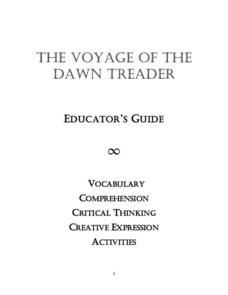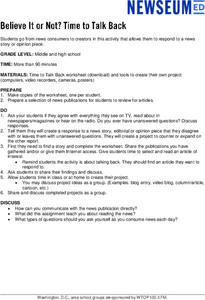iCivics
Step Four: Working with Websites
Almost every profession today relates to websites in some way! The resource tasks the class to fill out three individual graphic organizers to help them analyze each website they visit.
Learning for Justice
Marian Wright Edelman
Marian Wright Edelman's 2014 Commencement Speech at Lewis and Clark College serves to inspire young scholars to investigate a problem in their community, to determine why the problem is important, and then to develop a plan for one thing...
National Endowment for the Humanities
Dostoevsky's Crime and Punishment
Pain and suffering do not have to be inevitable in a study of Crime and Punishment. A carefully scaffolded lesson introduces readers to the divided natures of the characters in Fyodor Dostoevsky's complex novel. Groups use the...
Novelinks
Zach’s Lie: Questioning Strategy – Cubing
Your class won't be a bunch of squares from using this well-rounded activity! Instead, they'll be expressing thoughtful questions using the cubing strategy. The class brainstorms questions of increasing rigor about Zach's Lie in the...
Institute for Teaching through Technology and Innovative Practices
The Right Number of Elephants
How can you tell if a number of items is reasonable? Combine math and language arts with a fun lesson based on Jeff Shepard's The Right Number of Elephants. After reading the book, kids discuss amounts of other items and create...
C.S. Lewis Foundation
Educator’s Guide to The Lion, The Witch and the Wardrobe #2
This chapter-by-chapter guide to The Lion, The Witch and the Wardrobe, designed to be used in either a classroom or homeschool setting, contains vocabulary lists, discussion questions, and writing prompts.
C.S. Lewis Foundation
Educator’s Guide to The Voyage of the Dawn Treader
The Voyage of the Dawn Treader guide includes chapter-by-chapter vocabulary lists and quizzes, discussion questions and writing prompts, and an explanation of Narnia expressions. Great for mainstream classrooms and homeschool situations.
Curated OER
Shizuko’s Daughter: Problematic Situation
How could you decide which of your late mother's possessions are important enough to take to college with you? Decide which items would be the most valuable to you with an activity based on Kyoko Mori's Shizuko's Daughter. After...
NASA
Freshwater Availability Classroom Activity
This science assignment produced by NASA teaches inquiring minds the distribution of Earth's water. Learners will appreciate and understand the importance of fresh water and how weather and climate affects everything.
University of Pennsylvania
Decoding Propaganda: J’Accuse…! vs. J’Accuse…!
Reading snail mail is a great way to go back into history and to understand others' points of view. The resource, the second in a five-part unit, covers the Dreyfus Affair. Scholars, working in two different groups, read one letter and...
Encyclopedia Britannica
Presidential Qualifications
Can anyone grow up to be president of the United States? As part of their study of the 2020 election, groups research the constitutional requirements to become president. The class then brainstorms a list of qualifications beyond those...
Encyclopedia Britannica
Candidate Position History Research
Climate change. Assault weapons ban. Death penalty. And the list goes on. So many issues are part of a US presidential election that it can be hard to determine a candidate's position on a particular topic and whether their position has...
Encyclopedia Britannica
Election Issue Comparison Chart
As part of a study of the issues raised in the 2020 presidential election campaign, class members investigate and then create a pro-con comparison chart that reveals each candidate's position on a variety of issues.
Teaching Tolerance
Thanksgiving Mourning
Two primary sources, a speech, and an article provide tweens and teens with different perspectives of the American Thanksgiving holiday. After analyzing Wamsutta James' suppressed speech and Jacqueline Keeler's article, class members use...
Tean Truth
Who Do You Admire and Why?
A five-question worksheet asks learners to consider who they admire, the qualities this person has that they admire, and why they find these characteristics admirable. To conclude, pupils select three of the qualities they admire in...
Tean Truth
Leaders Are, Can, and Think
A great way to begin a discussion of leadership is to have learners reflect on their own experiences with leadership. A one-page worksheet asks individuals to list what they believe are the top characteristics, qualities, and beliefs of...
WE Charity
Exploring the Four Leadership Styles
What is your leadership style? Tweens and teens independently complete a Four Leadership Styles worksheet. Once completed, they use a leadership code to identify their prominent leadership style. Class members gather by style, brainstorm...
Jane Addams Project
Woman Suffrage
Suffragettes, suffragists, and anti-suffragists. A two-day, richly detailed lesson plan has young historians investigate the twentieth-century suffrage movement. Groups examine primary and secondary source materials about Jane Addams and...
Newseum
Disinformation Nation: Separating Politics and Propaganda
Separating political rhetoric from propaganda is no small feat. Class members are challenged to examine two different sources about a candidate in an upcoming election and determine whether the primary purpose of the source is to inform...
Newseum
When Tragedy Hits — Role-Playing a Breaking News Story
Young journalists engage in a role-playing exercise that asks them to consider the journalism and ethical issues raised by the coverage of the mass shootings at Virginia Tech on April 16, 2007. Pupils play the role of either a reporter...
Newseum
Is This Story Share-Worthy?
Young journalists use a "Is This Story Share-Worthy?" flowchart graphic to decide whether a story is worth sharing online. Instructors provide groups with fake news, poor quality stories, opinion pieces, biased news, and high-quality...
Newseum
Believe It or Not? Time to Talk Back
Young journalists select a news story, editorial, or opinion piece that they disagree with or one that leaves them with questions. They then create their report in response and share it with the class.
Newseum
Bias Through History: Analyzing Historical Sources
Young journalists use the E.S.C.A.P.E. (evidence, source, context, audience, purpose, and execution) strategy to evaluate historical and contemporary examples of bias in the news. The class then uses the provided discussion questions to...
Penguin Books
A Teacher's Guide to The Omnivore’s Dilemma: A Natural History of Four Meals by Michael Pollan
"What should we have for dinner?" "What am I eating?" "Where did it come from?" These three questions are at the heart of Michael Pollan's The Omnivore's Dilemma: A Natural History of Four Meals. Pollan's book provides some very...
Other popular searches
- Reviews and Criticism
- United Nations Criticism
- Literary Criticism
- Accepting Criticism
- Constructive Criticism
- Feminist Criticism
- Types of Literary Criticism
- Canadian Artists Criticism
- Social Criticism
- Teaching Literary Criticism
- Dance Criticism
- Literary Criticism Beloved

























